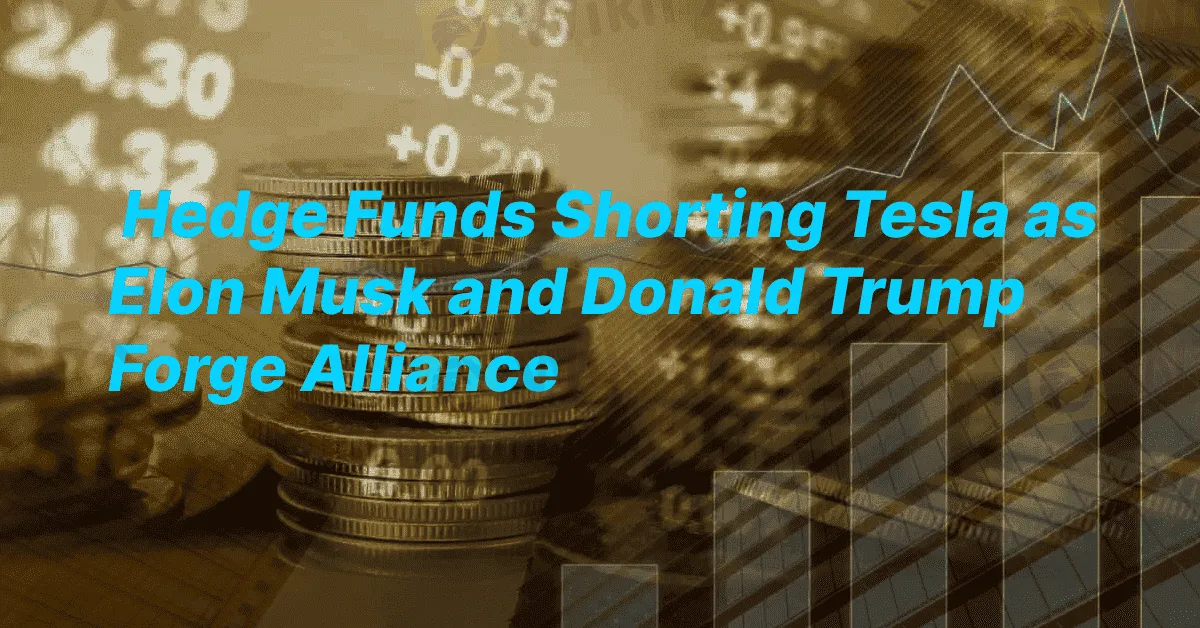简体中文
繁體中文
English
Pусский
日本語
ภาษาไทย
Tiếng Việt
Bahasa Indonesia
Español
हिन्दी
Filippiiniläinen
Français
Deutsch
Português
Türkçe
한국어
العربية
Hedge Funds Shorting Tesla as Elon Musk and Donald Trump Forge Alliance
Abstract:Since Donald Trump’s election victory, hedge funds that maintained short positions on Tesla Inc. have incurred staggering losses, exceeding $5 billion on paper. This setback comes as Elon Musk, the Tesla CEO and the world’s richest person, publicly endorses Trump, aligning himself as one of the president-elect's most prominent billionaire supporters.

Since Donald Trump‘s election victory, hedge funds that maintained short positions on Tesla Inc. have incurred staggering losses, exceeding $5 billion on paper. This setback comes as Elon Musk, the Tesla CEO and the world’s richest person, publicly endorses Trump, aligning himself as one of the president-elect's most prominent billionaire supporters.
A $5.2 Billion Blow to Short Sellers
Data compiled by S3 Partners, and analyzed by Bloomberg, shows that hedge funds shorting Tesla took an on-paper loss of $5.2 billion between election day and Friday's close. These funds are among a diminishing number that still bet against Tesla as many peers unwound their positions over the previous four months, according to Hazeltree data tracking more than 500 hedge funds. This reshuffling aligns closely with Musk's endorsement of Trump in July, signaling a new strategic alliance between the two influential figures.
Musks Political Endorsement Boosts Tesla Stock
Musk‘s public support for Trump’s 2024 campaign has created a ripple effect across Tesla‘s stock price. Since the November 5 election, Tesla shares have surged by nearly 30%, driving the company’s market value beyond the $1 trillion threshold. This appreciation is remarkable given the challenges faced by the broader electric vehicle (EV) industry, which has struggled with trade tensions, softening demand, and mounting competition. In contrast to the industry, which has seen a decline of over 12% this year, Tesla has defied the trend, climbing roughly 30% in 2024 alone.
The price surge reflects Tesla‘s resilience, supported by Musk’s willingness to align his business and influence with political dynamics. As one of Trumps top financial backers, Musk has positioned himself as a potential future political insider in the Trump administration, a move that could yield strategic benefits for Tesla.
Shrinking Short Positions as Hedge Funds Adjust Strategy
In July, nearly 20% of hedge funds tracked by Hazeltree held short positions against Tesla, betting that its high valuation was unsustainable. However, many of these funds were caught off guard by Teslas robust sales figures, which fueled a steep stock rally. Since then, short positions have dwindled significantly; as of November 6, only 7% of hedge funds were still net short Tesla, down from 17% in July. Even fewer funds, about 8%, are net long on Tesla, indicating a broad shift among hedge funds toward neutrality on the stock.
Hedge fund managers like Per Lekander, CEO of Clean Energy Transition, exemplify the cautious approach many have taken with Tesla shorts. Lekander revealed that while his fund held a small short position on Tesla going into the election, they had scaled it back significantly, limiting their losses.
“We have lost some money,” Lekander admitted, but emphasized that his firms exposure had been minimized ahead of the surge.
Teslas Advantage Amidst Industry Headwinds
The broader EV sector has struggled, with the KraneShares Electric Vehicles and Future Mobility Index ETF down over 12% this year after a similar 9% drop in 2023. In contrast, Tesla‘s continued rise speaks to its ability to dominate a competitive and turbulent market, as well as its unique positioning under Musk’s influence.
In a shifting landscape of political alliances and market dynamics, Musk‘s move has intensified the challenge for hedge funds trying to bet against Tesla. With Musk now a prominent Trump ally, hedge funds shorting Tesla may find that political forces are as much a part of Tesla’s success as technological advancements and consumer loyalty.

Disclaimer:
The views in this article only represent the author's personal views, and do not constitute investment advice on this platform. This platform does not guarantee the accuracy, completeness and timeliness of the information in the article, and will not be liable for any loss caused by the use of or reliance on the information in the article.
Read more

Beware of Gold Bar Investment Scams: Rising Threats
Gold bar scams surge in 2025 as gold prices hit $3,000/oz, targeting seniors. Learn how scammers exploit trust in gold and tips to avoid these frauds.

Why Trade Agreements Matter to Nations
In today’s interconnected world, trade agreements serve as the foundation for stable and predictable international commerce.

Trade Fights Are Heating Up—What Happens Next?
Global financial markets have become increasingly reactive to even minor developments in international trade talks.

Juno Markets Upgrades to FYNXT PAMM
Juno Markets has successfully upgraded its managed account infrastructure by integrating FYNXT’s Percent Allocation Management Module (PAMM) system.
WikiFX Broker
Latest News
eXch Exchange to Shut Down on May 1 Following Laundering Allegations
Think Scams Won’t Happen to You? That’s Exactly What Scammers Count On
Beware of Gold Bar Investment Scams: Rising Threats
Over $4 Billion Laundered Through Crypto Scams in Paraguay
Currency Calculator


